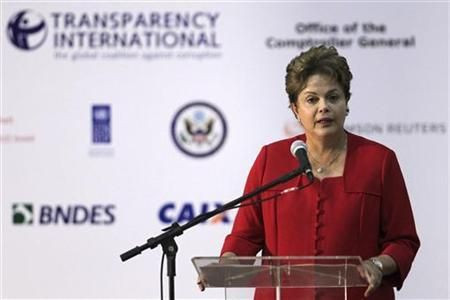
Brazilian President Dilma Rousseff is under pressure to veto an oil royalty bill that will slash the revenues of Rio de Janeiro state and put the 2016 Olympics and the 2014 World Cup in peril, according to the state's governor.
The bill passed by Congress on Tuesday cuts royalty payments to governments where about 80 percent of the country's oil and natural gasis produced and shares it out more equally among Brazil's 27 states and more than 5,500 municipalities. It also redirects royalties to a national fund for social programs.
Rio de Janeiro and Espirito Santo states, which have been experiencing an oil-led boom, stand to lose most. Rio alone will lose about $2 billion in 2013 and forgo $39 billion in revenue by 2020, the state development secretariat said.
"This bill will cause the financial collapse of the state of Rio de Janeiro," Governor Sergio Cabral warned in Brasilia on Wednesday. "It's totally unfeasible. The state would have to close its doors. There would be no Olympics, no World Cup, no payments for retirees and pensioners."
Cabral said he was confident Rousseff will veto the bill because it would modify existing oil exploration and production contracts between companies and the government, a move she has strongly opposed.
Rousseff has not decided yet whether to sign or veto the bill, a member of her cabinet told reporters. She has 15 days to study the bill and decide.
The bill was passed a year ago by the Senate but held up in the Chamber of Deputies by opposition from Rousseff and the three oil producing states. It cleared Congress on Wednesday with the overwhelming backing of states that produce no oil.
The legislation has been in the works since 2007 when Brazil discovered some of the world's most promising oil reserves in a deep-water region now known as the "subsalt".
The New York-state-sized area off Brazil's coast near Rio de Janeiro and Sao Paulo may contain as much as 100 billion barrels of oil and natural gas equivalent according the Brazilian Petroleum Institute at the State University of Rio de Janeiro.
That's enough to supply all U.S. oil needs for more than 14 years.
One reason for Rousseff to veto the bill is that the Rio de Janeiro state government will almost certainly go to the country's Supreme Court to contest the legality of altering existing contracts.
A drawn out legal battle would create legal risks for the oil industry and hinder plans to hold Brazil's first oil rights auctions in more than four years in 2013, delaying the oil bonanza expected from the untapped "subsalt" reserves.
Brazil is counting on that wealth to continue the policies of Rousseff's ruling Workers' Party to reduce poverty and raise the standard of living in the world's sixth-largest economy.
The emerging market nation is also looking to the windfall to modernize its dilapidated infrastructure that has become a serious obstacle to its growth and development.
Congested airports, insufficient public transport and delays to soccer stadium upgrades have raised concerns about Brazil's ability to hold the 2014 World Cup soccer tournament and the Olympics in the city of Rio de Janeiro two years later.
Reducing the state's royalties would make it hard to pay for the Games, its leading role in the World Cup - the final will be played in Rio's famed Maracanã stadium - and security measures that have curbed the city's notorious violence, Cabral warned.
© Thomson Reuters.




